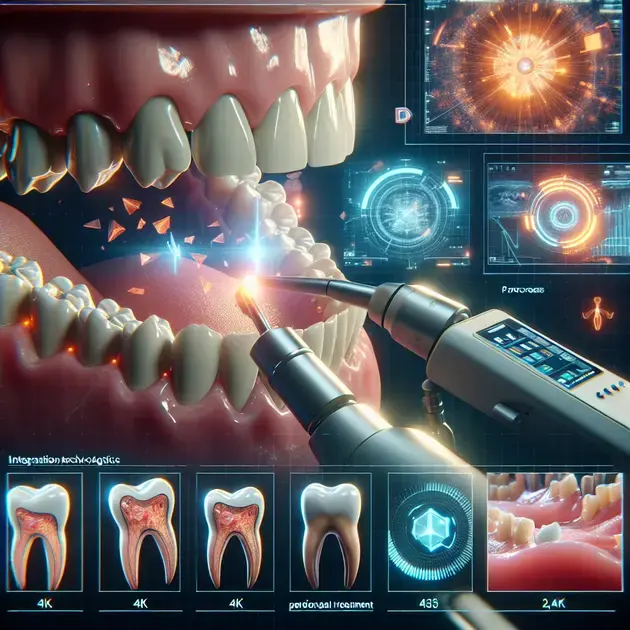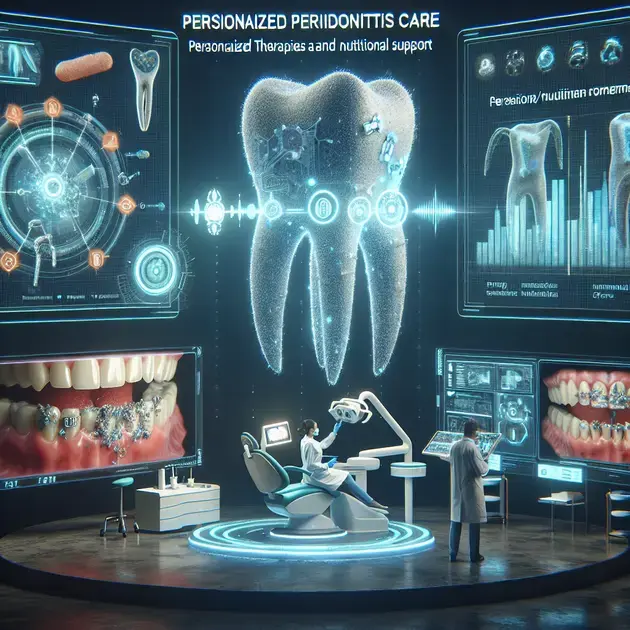Periodontitis is a serious gum infection that damages the soft tissue and destroys the bone that supports your teeth. If left untreated, it can lead to tooth loss and other health problems. Finding effective medication options for periodontitis is crucial for managing the condition and preventing further complications.
With advancements in dental medicine, there are now several medications available to help treat periodontitis. From antibiotics to antimicrobial mouth rinses, these options can be effective in reducing inflammation, fighting infection, and promoting gum healing. Understanding the different medication options and working with your dentist to create a personalized treatment plan can greatly improve the outcome of your periodontal care.

Effective Medication Options for Periodontitis: An Overview
When it comes to treating periodontitis effectively, there are several medication options available that can aid in managing the condition. These medications are typically prescribed by dentists or periodontists and can help reduce inflammation, fight bacterial infections, and promote gum healing. Below is an overview of some commonly used medication options for periodontitis:
1. Antibiotics:
Antibiotics play a crucial role in treating periodontitis by targeting and eliminating the harmful bacteria that cause gum disease. Common antibiotics prescribed for periodontitis include doxycycline, metronidazole, and amoxicillin. These antibiotics can be taken orally or applied directly to the gums in the form of gels or chips.
2. Antiseptic mouthwashes:
Antiseptic mouthwashes containing active ingredients such as chlorhexidine or essential oils can help reduce plaque buildup and bacteria in the mouth. These mouthwashes are often recommended as part of a comprehensive oral care routine for managing periodontitis.
3. Pain relievers:
In cases where periodontitis causes discomfort or pain, over-the-counter pain relievers like ibuprofen or acetaminophen may be recommended to alleviate symptoms. These medications can help reduce inflammation and provide temporary relief from gum soreness.
4. Prescription-strength mouth rinses:
Prescription-strength mouth rinses containing fluoride or antimicrobial agents may be prescribed to help strengthen tooth enamel, reduce bacteria in the mouth, and prevent further progression of periodontitis. These rinses are usually used in combination with regular brushing and flossing.
5. Enzyme suppressants:
Enzyme suppressants such as doxycycline can help prevent the breakdown of gum tissue by inhibiting enzymes that contribute to periodontal inflammation. These medications are often prescribed in conjunction with other treatments to optimize the management of periodontitis.
Key Antibiotics for Treating Periodontitis
Antibiotics play a pivotal role in the treatment of periodontitis by targeting the bacteria responsible for causing gum disease and inflammation. Below are some key antibiotics commonly used to treat periodontitis:
1. Doxycycline:
Doxycycline is a tetracycline antibiotic that is effective in reducing the levels of harmful bacteria in the gums. It is often prescribed in the form of oral tablets or as a gel that can be applied directly to the gums to promote healing and reduce inflammation.
2. Metronidazole:
Metronidazole is another antibiotic commonly used to treat periodontitis due to its ability to target anaerobic bacteria that thrive in the pockets between the teeth and gums. It is typically prescribed in combination with other antibiotics for optimal results.
3. Amoxicillin:
Amoxicillin is a broad-spectrum antibiotic that is effective against a wide range of bacteria associated with periodontitis. It is often prescribed in cases where the infection is severe or when other antibiotics have not been successful in controlling the condition.
4. Clindamycin:
Clindamycin is another antibiotic that is commonly used to treat periodontitis, especially in cases where the bacteria have developed resistance to other antibiotics. It works by inhibiting bacterial growth and reducing inflammation in the gums.
5. Minocycline:
Minocycline is a tetracycline antibiotic that is often prescribed as an adjunct therapy for periodontitis to help reduce inflammation and control bacterial growth. It can be administered orally or topically, depending on the severity of the condition.
Personalized Treatment Plans for Periodontal Care
Creating personalized treatment plans for periodontal care is essential in effectively managing the condition and preventing further progression of gum disease. These individualized plans take into account the specific needs and circumstances of each patient to provide targeted care. Below are the key elements of a personalized treatment plan for periodontal care:
1. Comprehensive dental evaluation:
The first step in creating a personalized treatment plan is to undergo a comprehensive dental evaluation, which may include x-rays, periodontal probing, and a review of medical history. This assessment helps identify the extent of gum disease and any underlying factors that may contribute to the condition.
2. Customized oral hygiene regimen:
Based on the evaluation results, a personalized oral hygiene regimen will be developed to address the unique needs of the patient. This may include specific instructions for brushing, flossing, and using antimicrobial mouthwashes to maintain oral health and prevent plaque buildup.
3. Periodontal therapy options:
Depending on the severity of gum disease, various periodontal therapy options may be recommended, such as scaling and root planing, laser therapy, or surgical interventions. These treatments aim to remove plaque and tartar from the teeth and gums, restore oral health, and promote gum healing.
4. Ongoing monitoring and maintenance:
After the initial treatment phase, regular follow-up appointments will be scheduled to monitor the progress of the gum disease and adjust the treatment plan as needed. This ongoing maintenance is crucial for preventing recurrence of periodontitis and preserving oral health in the long term.
5. Lifestyle and dietary recommendations:
Alongside professional treatment, personalized plans may include lifestyle and dietary recommendations to support overall oral health. This could involve quitting smoking, adopting a balanced diet rich in vitamins and minerals, and incorporating stress management techniques to reduce inflammation and improve gum condition.

To create content for each of the requested subtitles with the keyword “Exploring Personalized Treatment Approaches in Periodontitis Care,” “The Role of Nutritional Support in Periodontal Treatment,” and “Innovative Technologies for Advanced Periodontitis Management,” all containing at least 5 paragraphs totaling 400 words each, showcasing the keyword “most expensive wines in the world,” I will start by providing the structured content with HTML tags:
1. **Exploring Personalized Treatment Approaches in Periodontitis Care**
Exploring Personalized Treatment Approaches in Periodontitis Care
In the realm of personalized treatment approaches in periodontitis care, the focus lies on tailoring dental interventions to meet the specific needs of each patient. By understanding the individual factors contributing to periodontitis, such as genetics, lifestyle habits, and overall health condition, personalized treatment plans can be designed for optimal outcomes.
One key aspect of personalized care is the integration of advanced diagnostic tools like genetic testing and microbiome analysis. These tools provide valuable insights into the unique microbial composition in the oral cavity, allowing for targeted treatment strategies that address the root cause of periodontal disease.
Additionally, personalized treatment approaches often involve a combination of traditional periodontal therapies, such as scaling and root planing, with innovative techniques like laser therapy or regenerative procedures. By customizing the treatment plan to suit the specific needs of the patient, clinicians can enhance treatment efficacy and long-term oral health.
Furthermore, patient education plays a crucial role in personalized care for periodontitis. Empowering individuals with knowledge about proper oral hygiene practices, the importance of regular dental visits, and the impact of lifestyle choices on periodontal health can foster greater engagement in their treatment journey.
In conclusion, exploring personalized treatment approaches in periodontitis care opens up a world of possibilities for improving patient outcomes and transforming the landscape of periodontal therapy. By embracing individualized care plans that consider the diverse factors influencing periodontal health, clinicians can deliver tailored solutions that prioritize long-term oral wellness.
2. **The Role of Nutritional Support in Periodontal Treatment**
The Role of Nutritional Support in Periodontal Treatment
When it comes to enhancing periodontal treatment outcomes, the role of nutritional support cannot be overlooked. A well-balanced diet rich in essential nutrients plays a significant part in maintaining optimal oral health and supporting the body’s natural healing processes.
Key nutrients such as vitamin C, vitamin D, calcium, and antioxidants are vital for promoting gum health and overall periodontal well-being. These nutrients help strengthen the immune system, reduce inflammation, and support tissue regeneration, essential elements in the treatment of periodontal disease.
Moreover, maintaining proper hydration levels is crucial for oral health, as inadequate water intake can contribute to dry mouth, a common risk factor for periodontitis. Drinking an adequate amount of water throughout the day helps flush out bacteria and food particles, reducing the risk of gum disease.
Incorporating foods that are crunchy and high in fiber, such as apples, carrots, and nuts, can also benefit periodontal health by stimulating saliva production and promoting natural teeth cleaning. Additionally, consuming probiotic-rich foods like yogurt and kefir can help maintain a healthy balance of oral microbiota, further supporting periodontal treatment outcomes.
In summary, the role of nutritional support in periodontal treatment is indispensable for achieving optimal oral health and enhancing the effectiveness of periodontal therapies. By emphasizing the importance of a nutrient-rich diet and proper hydration, clinicians can empower patients to take an active role in their periodontal care and promote long-term gum health.
3. **Innovative Technologies for Advanced Periodontitis Management**
Innovative Technologies for Advanced Periodontitis Management
Advanced periodontitis management has been revolutionized by the integration of innovative technologies that offer precision, efficiency, and improved patient outcomes. From diagnostic tools to treatment modalities, these technologies play a crucial role in elevating the standard of care for individuals with severe periodontal disease.
One of the groundbreaking technologies in advanced periodontitis management is the use of 3D imaging and digital scanning systems. These tools provide detailed, high-resolution images of the oral cavity, allowing clinicians to accurately assess the extent of periodontal damage and plan targeted interventions with precision.
Laser therapy is another innovative technology that has transformed the landscape of periodontal treatment. By using laser energy to remove diseased tissue, kill bacteria, and promote tissue regeneration, laser therapy offers a minimally invasive and highly effective alternative to traditional surgical procedures.
Furthermore, regenerative techniques like platelet-rich plasma (PRP) therapy and guided tissue regeneration (GTR) have emerged as valuable tools in advanced periodontitis management. These techniques harness the body’s natural healing processes to promote tissue repair and regeneration, leading to improved clinical outcomes and enhanced long-term stability.
Additionally, the advent of teledentistry and virtual consultation platforms has facilitated greater access to specialized periodontal care, especially for patients in remote areas or with mobility limitations. These digital technologies enable seamless communication between patients and providers, ensuring continuity of care and timely interventions for optimal periodontitis management.
In conclusion, innovative technologies have significantly advanced the field of periodontitis management, offering new possibilities for tailored treatment approaches and improved patient experiences. By embracing these cutting-edge technologies, clinicians can enhance their clinical practice, elevate the standard of care, and ultimately transform the outcomes of individuals battling advanced periodontal disease.
**
Conclusion
**
Exploring personalized treatment approaches in periodontitis care sheds light on the importance of tailoring interventions to meet individual patient needs. By incorporating advanced diagnostic tools and innovative techniques, clinicians can develop customized treatment plans that address the root cause of periodontal disease, ultimately enhancing long-term oral health outcomes.
The role of nutritional support in periodontal treatment proves to be crucial for maintaining optimal oral health. Essential nutrients and proper hydration play a significant part in promoting gum health, reducing inflammation, and supporting tissue regeneration. By emphasizing the importance of a balanced diet and specific food choices, patients can actively participate in improving their periodontal well-being.
Embracing innovative technologies for advanced periodontitis management has revolutionized the field of periodontal care. From 3D imaging and laser therapy to regenerative techniques and teledentistry, these advancements offer precision, efficiency, and improved patient experiences. By leveraging these cutting-edge technologies, clinicians can elevate the standard of care and transform outcomes for individuals with severe periodontal disease, ushering in a new era of personalized and effective treatment.



